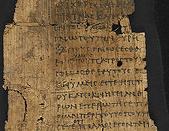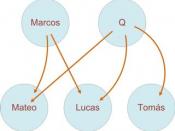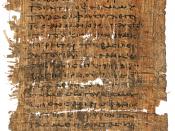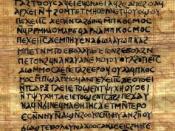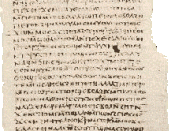Religion 313Reading: Gospels of Thomas. As stated in the first sentence, in The Complete Gospels, the Gospel of Thomas is a ÃÂsayings gospel.ÃÂ The reader can note that the ThomasÃÂ documentation most always relates to words, or sayings, of Jesus. According to the reading, the Gospel of Thomas ÃÂbelongs to a lively tradition in the first century Judaism: Wisdom (pg. 303).ÃÂ The readings also state that Thomas favored a more conservative idea of wisdom. These gospels also contain more theological elements, rather than any historical narratives; this is mainly based on the fact that, once again, this is a compilation of the sayings of Jesus, rather than recorded historical facts.
In the Gospels of Thomas, Jesus is portrayed as sent from God to remind the citizens on Earth of where they came from, and to where they will ultimately return. In essence, ThomasÃÂ writings are to remind people to ÃÂmindÃÂ there actions, and to value God.
As stated above, this Gospel is based on the sayings of Jesus, so Thomas records Jesus as speaking with reference to family, community leaders, and traditional piety, according to the text.
The Gospel of Thomas is still in its infancy, according to the Complete Gospels, it has only been studied for a few decades. The complete text is Coptic, which few scholars can effectively translate. This fact caused me to question the translation of the Gospels of Thomas, and how the translator may have interpreted the writings.
In the readings from Reddish, it is further stated that the Gospel of Thomas is based on sayings. Reddish describes that there is no overall structure, but rather that the context is grouped by content. Reddish posed the idea of Gnosticism in the Gospels of Thomas, and whether is existed, or not. In reference to Gnosticism is the idea of sexual differentiation, which was seen as an evil. There is also an argument on these gospels having no parallel to the New Testament, in which scholars dispute the sayings which may and may not have been said by Jesus. In my opinion, there would be no way to tell what Jesus may, or may not have said, we are forced to go on faith; however, there are many indications to what Jesus may have preached, and what might have been ÃÂwords put in his mouth.ÃÂIn Excavating Jesus, there is a great deal of reference to the city of Nazareth. There are references to various time periods as well. To be quite honest, I noticed the reference to synagogue, but was not able to correlate the importance of this. I will re-read this portion of the book, along with the text(s) that it was supposed to correlate with, and hopefully be able to reach a better understanding of this idea.

